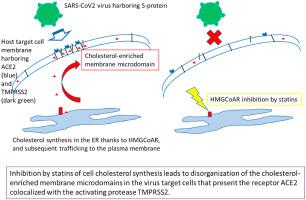Biochimie ( IF 3.3 ) Pub Date : 2021-06-18 , DOI: 10.1016/j.biochi.2021.06.005 Stéphane Orlowski 1 , Jean-Jacques Mourad 2 , Antonio Gallo 3 , Eric Bruckert 3

|
The infectious power of coronaviruses is dependent on cholesterol present in the membranes of their target cells. Indeed, the virus enters the infected cell either by fusion or by endocytosis, in both cases involving cholesterol-enriched membrane microdomains. These membrane domains can be disorganized in-vitro by various cholesterol-altering agents, including statins that inhibit cell cholesterol biosynthesis. As a consequence, numerous cell physiology processes, such as signaling cascades, can be compromised. Also, some examples of anti-bacterial and anti-viral effects of statins have been observed for infectious agents known to be cholesterol dependent. In-vivo, besides their widely-reported hypocholesterolemic effect, statins display various pleiotropic effects mediated, at least partially, by perturbation of membrane microdomains as a consequence of the alteration of endogenous cholesterol synthesis. It should thus be worth considering a high, but clinically well-tolerated, dose of statin to treat Covid-19 patients, in the early phase of infection, to inhibit virus entry into the target cells, in order to control the viral charge and hence avoid severe clinical complications. Based on its efficacy and favorable biodisposition, an option would be considering Atorvastatin, but randomized controlled clinical trials are required to test this hypothesis. This new therapeutic proposal takes benefit from being a drug repurposing, applied to a widely-used drug presenting a high efficiency-to-toxicity ratio. Additionally, this therapeutic strategy avoids any risk of drug resistance by viral mutation since it is host-targeted. Noteworthy, the same pharmacological approach could also be proposed to address different animal coronavirus endemic infections that are responsible for heavy economic losses.
中文翻译:

冠状病毒、胆固醇和他汀类药物:Covid-19 的参与和应用
冠状病毒的感染力取决于其靶细胞膜中存在的胆固醇。事实上,病毒通过融合或内吞作用进入受感染的细胞,这两种情况都涉及富含胆固醇的膜微区。这些膜结构域可以在体外被各种胆固醇改变剂破坏,包括抑制细胞胆固醇生物合成的他汀类药物。因此,许多细胞生理过程,如信号级联,可能会受到影响。此外,已经观察到他汀类药物对已知依赖胆固醇的传染原具有抗菌和抗病毒作用的一些例子。体内除了广泛报道的降低胆固醇的作用外,他汀类药物还显示出各种多效性作用,至少部分是由内源性胆固醇合成改变引起的膜微区扰动介导的。因此,值得考虑在感染早期使用高但临床耐受性良好的他汀类药物治疗 Covid-19 患者,以抑制病毒进入靶细胞,从而控制病毒电荷,从而控制避免严重的临床并发症。基于其功效和有利的生物处置,一种选择是考虑阿托伐他汀,但需要随机对照临床试验来检验这一假设。这种新的治疗方案受益于药物再利用,适用于具有高效率毒性比的广泛使用的药物。此外,这种治疗策略避免了病毒突变引起的任何耐药风险,因为它是针对宿主的。值得注意的是,还可以提出相同的药理学方法来解决造成重大经济损失的不同动物冠状病毒地方性感染。











































 京公网安备 11010802027423号
京公网安备 11010802027423号